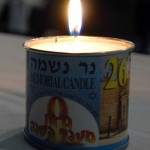Yizkor – Ask the Rabbi
 Q. In our shule there is an exodus, especially of children, once Yizkor starts. Does Judaism really require people whose parents are alive to absent themselves at this point?
Q. In our shule there is an exodus, especially of children, once Yizkor starts. Does Judaism really require people whose parents are alive to absent themselves at this point?
A. No. Yizkor is for every Jew. The notion that those whose parents are, thank God, still alive should leave the service at this point, as if their presence would tempt the Angel of Death, is unfortunate, indecorous and unnecessary.
Tradition suggests that those whose parents are living should not recite the Mourners’ Kaddish, but this principle of etiquette does not apply to Yizkor.
Yizkor arose after the massacres that accompanied the First Crusade, when surviving communities established the practice of reading the names of the martyred dead from the community Memorbuch.
Soon the practice was expanded to embrace the memory of all those who have died, and people began to focus their concern on the memory of their own dear ones, finally giving rise to the erroneous idea that the need to say Yizkor is limited to those whose parents are no longer alive.
The very fact that Yizkor began as an act of community remembrance suggests that our own generation should reclaim this concept and everyone should use the occasion for a tribute of remembrance of the martyrs of the Holocaust and those whose lives were lost in the defence of Israel.
Indeed since all of us have been bereaved of forebears who helped to hand down to us both life and the torch of Jewish continuity, it is appropriate for every one of us to remain in the synagogue and say a prayer in their memory, whilst at the same time expressing thanksgiving for the lives of those who are fortunately still with us.



